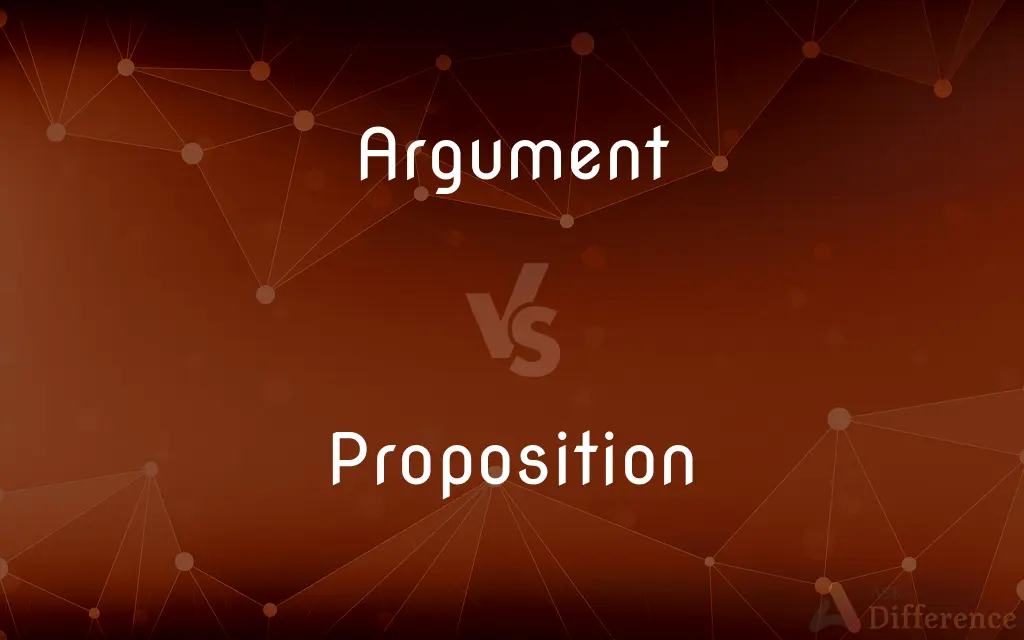Argument vs. Proposition — What's the Difference?
Edited by Tayyaba Rehman — By Maham Liaqat — Updated on March 16, 2024
Argument involves presenting a series of statements to support a conclusion, while a proposition is a statement or assertion that expresses a judgment or opinion.

Difference Between Argument and Proposition
Table of Contents
ADVERTISEMENT
Key Differences
An argument is a reasoning process where premises are presented to support a conclusion, aiming to persuade or demonstrate the truth of a statement. It often involves a sequence of statements or premises leading logically to a conclusion. On the other hand, a proposition is a specific statement or assertion that expresses a judgment, opinion, or concept that can be true or false. It is usually a single declarative sentence that can be evaluated for its truth value.
Arguments are constructed to convince or persuade the audience of the validity of a conclusion based on the evidence or premises provided. They are fundamental in debates, legal cases, and philosophical discussions. Whereas propositions serve as the basic building blocks of arguments, they are the claims or assertions that arguments seek to prove or refute.
While arguments are evaluated based on their validity and soundness, propositions are evaluated based on their truth value. An argument's validity depends on the logical structure, whereas its soundness depends on the truth of its premises. On the other hand, a proposition's evaluation is straightforward: it is either true or false.
Arguments often require a deep understanding of logic, reasoning, and critical thinking to be constructed and deconstructed effectively. They are dynamic and can be complex, consisting of multiple premises leading to a conclusion. Conversely, propositions are simpler, single statements that represent a specific idea or claim without the inherent complexity of logical structuring.
While both arguments and propositions play crucial roles in the structure of logical discourse and reasoning, they serve different purposes. Arguments aim to establish the truth of a conclusion through a logical sequence of statements, whereas propositions are those statements or claims themselves, which can be either accepted or rejected based on their truth value.
ADVERTISEMENT
Comparison Chart
Definition
A series of statements or premises leading logically to a conclusion.
A statement or assertion that expresses a judgment or opinion.
Purpose
To persuade or demonstrate the truth of a conclusion.
To present a claim or assertion for evaluation.
Evaluation
Based on validity (logical structure) and soundness (truth of premises).
Based on truth value (true or false).
Complexity
Can be complex, involving multiple premises and logical reasoning.
Simpler, often a single declarative sentence.
Role in Logic
Constructs that use evidence or logic to support or refute a conclusion.
Basic building blocks that are the content of arguments.
Compare with Definitions
Argument
A reasoning process.
The argument over climate change involves various scientific evidences.
Proposition
Statement or assertion.
The proposition that all swans are white was disproven.
Argument
Involves conclusion.
The conclusion of his argument was compelling and well-supported.
Proposition
Evaluated for truth value.
Every mathematical proposition can be evaluated for its truth value.
Argument
Aims to persuade.
The lawyer’s argument aimed to persuade the jury of the client’s innocence.
Proposition
Expresses judgment.
His proposition about the new policy sparked a heated debate.
Argument
Logical structure.
A strong argument has a clear and logical structure.
Proposition
Can be true or false.
The proposition “The earth orbits the sun” is true.
Argument
Series of statements.
His argument consisted of three main points.
Proposition
Simpler than arguments.
A single proposition can spark complex arguments.
Argument
In logic and philosophy, an argument is a series of statements (in a natural language), called the premises or premisses (both spellings are acceptable), intended to determine the degree of truth of another statement, the conclusion. The logical form of an argument in a natural language can be represented in a symbolic formal language, and independently of natural language formally defined "arguments" can be made in math and computer science.
Proposition
In logic and linguistics, a proposition is the meaning of a declarative sentence. In philosophy, "meaning" is understood to be a non-linguistic entity which is shared by all sentences with the same meaning.
Argument
An exchange of diverging or opposite views, typically a heated or angry one
There was some argument about the decision
I've had an argument with my father
Heated arguments over public spending
Proposition
A plan suggested for acceptance; a proposal.
Argument
A reason or set of reasons given in support of an idea, action or theory
He rejected the argument that keeping the facility would be costly
There is a strong argument for submitting a formal appeal
Proposition
A matter to be dealt with; a task
Finding affordable housing can be a difficult proposition.
Argument
An independent variable associated with a function or proposition and determining its value. For example, in the expression y = F(x₁, x₂), the arguments of the function F are x₁ and x₂, and the value is y.
Proposition
A subject for discussion or analysis.
Argument
Any of the noun phrases in a clause that are related directly to the verb, typically the subject, direct object, and indirect object.
Proposition
A statement that affirms or denies something.
Argument
A summary of the subject matter of a book.
Proposition
The meaning expressed in such a statement, as opposed to the way it is expressed.
Argument
A discussion in which the parties involved express disagreement with one another; a debate
Philosophical arguments over the nature of existence.
Proposition
(Mathematics) A theorem.
Argument
An angry discussion involving disagreement among the participants; a quarrel
The roommates had an argument about whose turn it was to wash the dishes.
Proposition
(uncountable) The act of offering (an idea) for consideration.
Argument
(Archaic) A reason or matter for dispute or contention
"sheath'd their swords for lack of argument" (Shakespeare).
Proposition
(countable) An idea or a plan offered.
Argument
A course of reasoning aimed at demonstrating truth or falsehood
Presented a strong argument for the arts in education.
Proposition
The terms of a transaction offered.
Argument
A fact or statement put forth as proof or evidence; a reason
The current low mortgage rates are an argument for buying a house now.
Proposition
In some states, a proposed statute or constitutional amendment to be voted on by the electorate.
Argument
A set of statements in which one follows logically as a conclusion from the others.
Proposition
(grammar) A complete sentence.
Argument
A summary or short statement of the plot or subject of a literary work.
Proposition
The content of an assertion that may be taken as being true or false and is considered abstractly without reference to the linguistic sentence that constitutes the assertion; (Aristotelian logic) a predicate of a subject that is denied or affirmed and connected by a copula.
“‘Wiktionary is a good dictionary’ is a proposition” is a proposition.
Argument
A topic; a subject
"You and love are still my argument" (Shakespeare).
Proposition
An assertion so formulated that it can be considered true or false.
Argument
(Logic) The minor premise in a syllogism.
Proposition
An assertion which is provably true, but not important enough to be called a theorem.
Argument
The independent variable of a function.
Proposition
A statement of religious doctrine; an article of faith; creed.
The propositions of Wyclif and Huss
Argument
The angle of a complex number measured from the positive horizontal axis.
Proposition
(poetic) The part of a poem in which the author states the subject or matter of it.
Argument
(Computers) A value used to evaluate a procedure or subroutine.
Proposition
To make an offer or suggestion to (someone).
Argument
(Linguistics) A word, phrase, or clause in a semantic relation with a word or phrase and that helps complete the meaning of that word or phrase, such as a noun phrase that is the object of a verb. The clause that we go is an argument of the verb suggest in the sentence I suggest that we go.
Proposition
The act of setting or placing before; the act of offering.
Argument
A fact or statement used to support a proposition; a reason.
Proposition
That which is proposed; that which is offered, as for consideration, acceptance, or adoption; a proposal; as, the enemy made propositions of peace; his proposition was not accepted.
Argument
A series of propositions organized so that the final proposition is a conclusion which is intended to follow logically from the preceding propositions, which function as premises.
Proposition
A statement of religious doctrine; an article of faith; creed; as, the propositions of Wyclif and Huss.
Some persons . . . change their propositions according as their temporal necessities or advantages do turn.
Argument
(countable) A process of reasoning; argumentation.
Proposition
A complete sentence, or part of a sentence consisting of a subject and predicate united by a copula; a thought expressed or propounded in language; a from of speech in which a predicate is affirmed or denied of a subject; as, snow is white.
Argument
(countable) An abstract or summary of the content of a literary work such as a book, a poem or a major section such as a chapter, included in the work before the content itself; (figuratively) the contents themselves.
Proposition
A statement in terms of a truth to be demonstrated, or of an operation to be performed.
Argument
(countable) A verbal dispute; a quarrel.
The neighbours got into an argument about the branches of the trees that extended over the fence.
Proposition
That which is offered or affirmed as the subject of the discourse; anything stated or affirmed for discussion or illustration.
Argument
Any dispute, altercation, or collision.
Steve got in a physical argument with his neighbor and came away with a black eye.
While biking home, he got in an argument with the pavement.
Proposition
The part of a poem in which the author states the subject or matter of it.
Argument
Any of the phrases that bears a syntactic connection to the verb of a clause.
Proposition
(logic) a statement that affirms or denies something and is either true or false
Argument
The independent variable of a function.
Proposition
A proposal offered for acceptance or rejection;
It was a suggestion we couldn't refuse
Argument
The phase of a complex number.
Proposition
The act of making a proposal;
They listened to her proposal
Argument
A quantity on which the calculation of another quantity depends.
The altitude is the argument of the refraction.
Proposition
A task to be dealt with;
Securing adequate funding is a time-consuming proposition
Argument
A value, or a reference to a value, passed to a function.
Parameters are like labelled fillable blanks used to define a function whereas arguments are passed to a function when calling it, filling in those blanks.
Argument
A parameter at a function call; an actual parameter, as opposed to a formal parameter.
Argument
A matter in question; a business in hand.
Argument
The subject matter of an artistic representation, discourse, or writing; a theme or topic.
Argument
Evidence, proof; (countable) an item of such evidence or proof.
Argument
To put forward as an argument; to argue.
Argument
To adduce evidence, to provide proof.
Argument
Proof; evidence.
There is.. no more palpable and convincing argument of the existence of a Deity.
Why, then, is it made a badge of wit and an argument of parts for a man to commence atheist, and to cast off all belief of providence, all awe and reverence for religion?
Argument
A reason or reasons offered in proof, to induce belief, or convince the mind; reasoning expressed in words; as, an argument about, concerning, or regarding a proposition, for or in favor of it, or against it.
Argument
A process of reasoning, or a controversy made up of rational proofs; argumentation; discussion; disputation.
The argument is about things, but names.
Argument
The subject matter of a discourse, writing, or artistic representation; theme or topic; also, an abstract or summary, as of the contents of a book, chapter, poem.
You and love are still my argument.
The abstract or argument of the piece.
[Shields] with boastful argument portrayed.
Argument
Matter for question; business in hand.
Sheathed their swords for lack of argument.
Argument
The quantity on which another quantity in a table depends; as, the altitude is the argument of the refraction.
Argument
The independent variable upon whose value that of a function depends.
Argument
To make an argument; to argue.
Argument
A fact or assertion offered as evidence that something is true;
It was a strong argument that his hypothesis was true
Argument
A contentious speech act; a dispute where there is strong disagreement;
They were involved in a violent argument
Argument
A discussion in which reasons are advanced for and against some proposition or proposal;
The argument over foreign aid goes on and on
Argument
A summary of the subject or plot of a literary work or play or movie;
The editor added the argument to the poem
Argument
A variable in a logical or mathematical expression whose value determines the dependent variable; if f(x)=y, x is the independent variable
Common Curiosities
Can a proposition be part of an argument?
Yes, propositions serve as the premises or claims that an argument seeks to prove or refute.
How is an argument evaluated?
An argument is evaluated based on its logical structure (validity) and the truth of its premises (soundness).
What is an argument?
An argument is a series of statements or premises logically arranged to support a specific conclusion.
How do arguments and propositions differ?
Arguments are complex structures aiming to persuade or prove, using propositions as building blocks, while propositions are simple statements expressing a judgment or idea.
What makes a proposition true or false?
A proposition's truth value depends on whether it accurately describes reality or a factual situation.
What is a proposition?
A proposition is a declarative statement that can be evaluated as true or false.
Are all arguments based on propositions?
Yes, arguments are constructed using propositions as the claims or assertions they aim to support or challenge.
Can a single proposition form an argument?
A single proposition cannot form an argument since an argument requires a series of statements leading to a conclusion.
Can the truth value of a proposition change over time?
The truth value of some propositions can change if new evidence or contexts emerge.
Why is the structure of an argument important?
The structure is crucial for ensuring the argument's logical coherence and persuasiveness.
How can one identify the main proposition in an argument?
The main proposition is typically the statement that the argument seeks to prove or the conclusion it aims to establish.
Do all propositions have to be factual?
While propositions are often factual, they can also express opinions, hypotheses, or theoretical scenarios.
Is it possible for a proposition to be neither true nor false?
In general, propositions are designed to be either true or false, but some philosophical or abstract propositions may challenge this binary.
How are complex arguments constructed?
Complex arguments are constructed by linking multiple propositions in a logical manner to support a broad conclusion.
What role do propositions play in debates?
Propositions serve as the statements or claims that are supported or contested in debates.
Share Your Discovery

Previous Comparison
Ugly vs. Beautiful
Next Comparison
Pickpocket vs. ThiefAuthor Spotlight
Written by
Maham LiaqatEdited by
Tayyaba RehmanTayyaba Rehman is a distinguished writer, currently serving as a primary contributor to askdifference.com. As a researcher in semantics and etymology, Tayyaba's passion for the complexity of languages and their distinctions has found a perfect home on the platform. Tayyaba delves into the intricacies of language, distinguishing between commonly confused words and phrases, thereby providing clarity for readers worldwide.














































